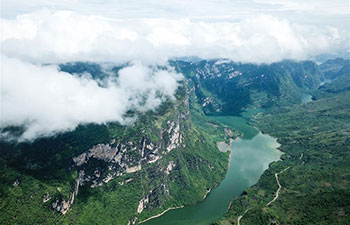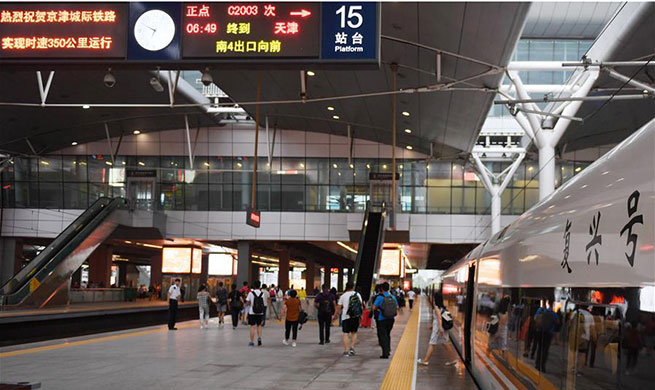NAIROBI, Aug. 8 (Xinhua) -- Kenya's leading property developers are staring at an uncertain future as the government intensifies implementation of a regeneration plan for the capital of Nairobi that has resorted to demolition of structures on riparian land and other sensitive biodiversity hotspots.
President Uhuru Kenyatta in December last year launched a Nairobi city regeneration master plan and a team of technocrats to oversee its implementation in order to restore green credentials of East Africa's largest metropolis.
The Kenyan leader tasked Nairobi city's regeneration team to come up with innovative ways to tackle pollution, traffic snarl ups, inadequate housing and crime.
Kenyatta ordered the team of technocrats, industry leaders and elected representatives to give priority to sustainable waste management, clean up of Nairobi's main water bodies and affordable housing as a means to enhance the city's renewal.
The implementation of Nairobi regeneration plan that has gone overdrive has been accompanied by demolition of residential and business premises sitting on riparian land.
Kenya's environmental watchdog on Aug. 6 oversaw demolition of a petrol station and a building housing--Java coffee house in Nairobi's up market Kileleshwa suburb because of encroaching on a riparian land.
Senior officials at the National Environment Management Authority (NEMA) disclosed that about 4,000 buildings located near river banks have been earmarked for demolition that will be carried out in the next two months.
Geoffrey Wahungu, the director general of NEMA, said an inter-agency team will carry out demolition of structures that had encroached on riparian land.
"There are so many buildings that have been constructed next to a river bank and we have given notice to unscrupulous developers who continue to flout basic environmental rules," said Wahungu.
He regretted that governance lapses and weak policing were to blame for mushrooming settlements along riparian zones in Nairobi and its adjacent satellite towns.
Julius Wanjau, the head of Nairobi Central Business District Association (NCBDA), said unscrupulous developers have to brace for astronomical losses or jail terms for encroaching on protected areas.
"We are not relenting on our efforts to restore Nairobi's green status by clearing structures built over wetlands and riparian land. Developers who break the law will not only incur losses but risks protracted battle with the courts," Wanjau told reporters.
He said demolition of residential and business premises located near river banks and other water sources will extend to the densely populated suburbs located on the eastern fringes of Nairobi.
Wanjau revealed that 600 pollution points have been identified along Nairobi River hence triggering an urgency to clear structures along its path.
President Uhuru Kenyatta and Nairobi county leaders have endorsed the operation to clean up the city through demolition of structures built on road reserves and near water bodies.
So far, dozens of police officers have been deployed to provide security during the demolition exercise that is expected to hurt the revenue base of private developers.
Reports from local media indicated that 8 million U.S. dollars has been set aside to support activities that will enhance Nairobi's environmental renewal.
The revelation that up market shopping malls that sit on wetlands are slated for demolition has sent shock waves to private developers who have promised to halt the process through court injunction.
However, the identification and mapping of illegal structures to pave way for their demolition and reclaim Nairobi's green stewardship will continue despite attempts by developers to rush to the courts and put brakes on the exercise.
Kenyan lawmakers during their recent tour of major water sources in Nairobi sounded alarm over massive encroachment of these vital ecosystems.
Kareke Mbiuki, the chairman of Parliamentary Committee on environment and natural resources said that punitive action will be taken against private developers who put up apartment blocks in water catchment zones.
Experts said enforcement of regulations to restore Nairobi's biodiversity hotpots should not be sacrificed at the altar of short-term commercial gain.
John Musingi, a Nairobi-based environmentalist supported the ongoing demolition of structures along river banks and wetlands terming them a wake-up call for private developers to adhere to laid down regulations.












